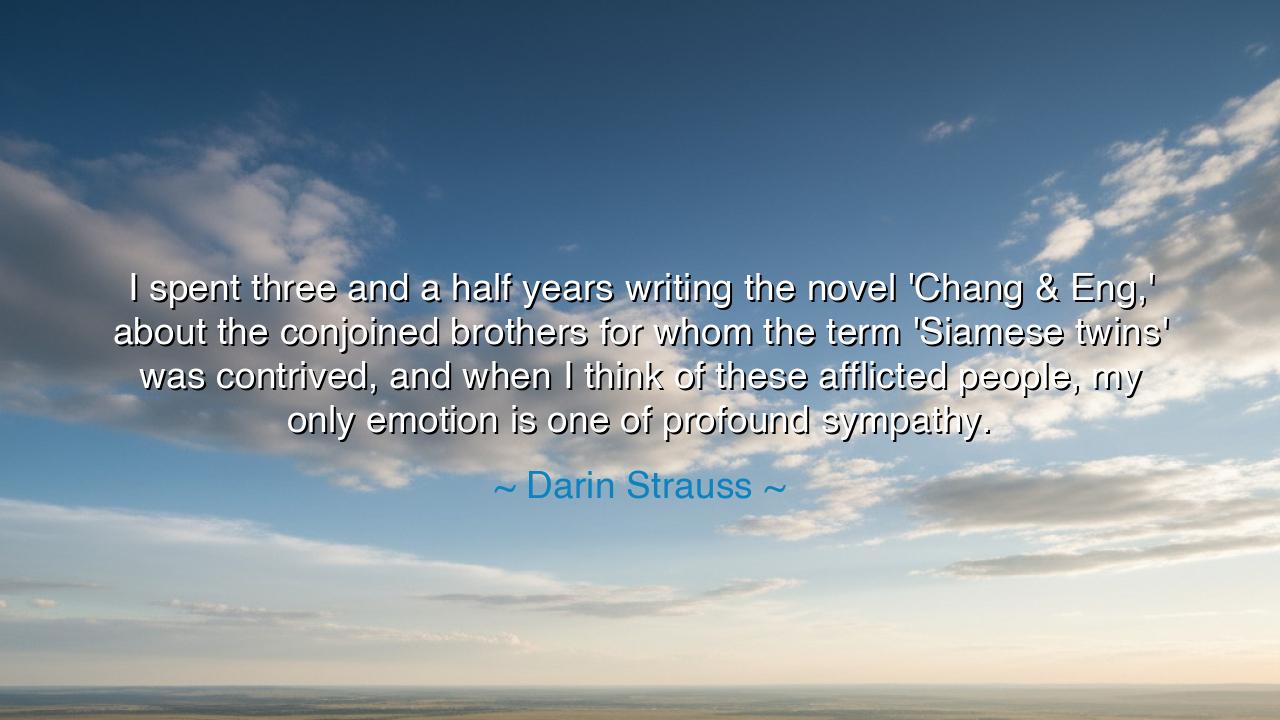
I spent three and a half years writing the novel 'Chang & Eng,'
I spent three and a half years writing the novel 'Chang & Eng,' about the conjoined brothers for whom the term 'Siamese twins' was contrived, and when I think of these afflicted people, my only emotion is one of profound sympathy.






Hear, O seekers of wisdom and compassion, the words of Darin Strauss, who declared: “I spent three and a half years writing the novel Chang & Eng, about the conjoined brothers for whom the term ‘Siamese twins’ was contrived, and when I think of these afflicted people, my only emotion is one of profound sympathy.” In this reflection, he offers us not only the tale of his own labor, but also a meditation upon suffering, upon human dignity, and upon the sacred duty of empathy for those whose lives bear a weight greater than our own.
The meaning is thus: Strauss, in devoting years to the story of Chang and Eng, was not merely writing a novel, but entering the lives of two men bound together in body from birth to death. These brothers, born in Siam, became spectacles in a world that could not look upon them without curiosity, and often without cruelty. They were men, yet they were made into symbols; they were human, yet treated as marvels. Strauss, beholding their story, was moved not to mockery nor to distance, but to profound sympathy—a recognition of their humanity amid affliction.
The ancients knew this sacred posture. Consider the philosophers of Stoic Rome, who taught that to suffer with dignity was noble, but to witness another’s suffering and meet it with compassion was divine. Seneca wrote that fate lays heavy burdens upon some not for scorn but as reminders to others of the fragility of life. In Chang and Eng’s ordeal, we see such a reminder: that even those afflicted deserve not only survival but respect, not only observation but honor. Strauss’s sympathy echoes this ancient creed: to see not the spectacle, but the soul.
History gives us also the example of Helen Keller, who, though deaf and blind, triumphed with courage and intellect. Yet the greater lesson lies in the response of her teacher, Anne Sullivan, who did not see in Helen merely affliction, but potential. Through profound sympathy, Sullivan transformed Keller’s life and, by extension, the world’s understanding of disability. Strauss, in telling the story of Chang and Eng with compassion, joins this lineage of those who turn society’s gaze away from ridicule and toward dignity.
What Strauss teaches is that storytelling itself can be an act of empathy. By writing Chang & Eng, he refuses to let them be remembered only as curiosities of history, bound by the crude term “Siamese twins.” Instead, he restores their humanity, reminding us that every affliction hides a story of endurance, of longing, of hope. To feel profound sympathy is not weakness, but wisdom; for in that sympathy lies the recognition that suffering is universal, and that dignity must be guarded for all.
The lesson, therefore, is clear: do not look upon affliction with curiosity alone, but with compassion. When you see another bound by hardship—whether it be illness, poverty, or sorrow—do not turn away, nor make them a spectacle. Instead, let sympathy move you to kindness, to understanding, to respect. For the measure of a civilization is not how it treats the strong, but how it honors the afflicted.
What then should you do? In your daily life, practice seeing humanity where others see difference. Speak with patience to those who struggle. Offer help not out of pity, but out of respect. Read and learn of those whose lives are unlike your own, so that your heart may grow wide enough to carry their stories. And when you tell of others, whether in speech or in writing, let your words, like Strauss’s, be filled not with judgment but with profound sympathy.
Thus let this teaching endure: to remember the afflicted not as curiosities, but as brothers and sisters, bearing burdens that might just as easily have been our own. For sympathy, when profound, is not mere emotion—it is the bridge that binds us together across time, across suffering, across all difference. And in building such bridges, we honor not only those who suffer, but the very essence of our shared humanity.






AAdministratorAdministrator
Welcome, honored guests. Please leave a comment, we will respond soon